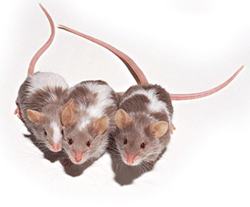 ZOOLOGIX rodent and rabbit
diagnostic testing
ZOOLOGIX rodent and rabbit
diagnostic testing
Why use PCR to detect infectious diseases of rodents and
rabbits?
Molecular diagnostic testing using PCR (Polymerase Chain
Reaction) has revolutionized the way vivarium managers,
veterinarians, researchers, zoos and animal care facilities
maintain animal health and obtain disease data.
The
sensitivity, specificity and speed with which pathogens and
mutations are
identified by PCR enable diagnostic, research and monitoring
possibilities unavailable using other techniques. Molecular
techniques represent a dramatically effective tool for the
diagnosis of disease in valuable populations of rodents,
rabbits and other animals.
In PCR
testing, nucleic acid -- DNA or RNA -- is isolated from a
specimen, then amplified (after an extra reverse transcription
step in the case of RNA) using highly specific primers
complementary to known target sequences. Positive and
negative
controls are run simultaneously; internal controls monitor
extraction and PCR efficiency. Each sample is run in duplicate
aliquots to check repeatability. Amplification is visualized and recorded using state-of-the-art protocols and
instrumentation.
When should
samples be collected?
Many pathogens
shed intermittently. Therefore, for antemortem testing it is
usually best to collect samples
when an animal is symptomatic. Often pathogen titers spike early
in a bout of symptoms, so ideally samples should be collected
early in a bout of symptoms, and when symptoms are worst. It is
possible for treatments to reduce symptoms and shedding
temporarily but not entirely clear the infection. If treatment
was administered, typically you should wait at least a week
following treatment, and/or until symptoms return, before
collecting a sample for testing.
How is molecular, PCR-based
testing complementary to other kinds of testing?
-
Cross-reactivity reduces the specificity of many
serological tests: a positive result can be caused by
organisms other than the target. Molecular assays, on the
other hand, are highly specific because they detect genetic
sequence unique to the target pathogen. Even closely related
pathogen strains can often be distinguished.
-
The influence of some sources of false positives is
reduced in molecular testing, because while other testing
methods detect antibodies to pathogens which may not still
be present, molecular assays detect the genetic material of
the pathogen itself -- a direct indication of presence of
the pathogen in the sample.
-
Infections can often be detected
by PCR
very early in a bout of symptoms. Detection is not
dependent on elevated antibody levels, which may take days
or weeks to occur.
-
Animals with high titres of some viruses can actually
exhibit very low antibody levels as their immune systems are
challenged by an infection. This can result in false
negative diagnoses if antibody testing alone is used.
-
PCR's exquisite sensitivity allows detection of a target
pathogen in a sample even if present in very low titres, and
even from very small sample volumes.
-
Many different sample types are appropriate for PCR
testing - not just serum. Check our
assay datasheets for any test's sample requirements.
About Zoologix
Since 2004, Zoologix
has served
animal care professionals with
molecular diagnostic testing for infectious diseases that affect
rodents and other research, domestic and wildlife species. Other
testing facilities perform PCR testing as a sideline. Because we
specialize in PCR assays for infectious diseases of animals, our
lab staff are adept at performing protocols designed to maintain
specimen integrity and maximize assay specificity and
sensitivity. We provide fast turnaround and competitive pricing
in each of our assay categories.
As an independent, dedicated diagnostic
laboratory not affiliated with any clinic or corporate
conglomerate, Zoologix is free of incentives to bias results. Zoologix is owned and
managed by board-certified scientists and seasoned laboratory
managers with extensive experience in molecular biology,
biochemistry, zoology, assay design, quality assurance and lab
operations. Our objective is to provide to the veterinary and
research communities the fastest, highest quality molecular
infectious disease testing available.
Client samples are stored at our lab for six months to
facilitate any followup testing.
Contact information
Zoologix is
headquartered in Westlake Village, in southern California. We are
located in the Conejo Valley biotech hub, near two major airports (LA International and Burbank),
UCLA, USC, CalTech and other regional research centers.
ZOOLOGIX
725 Lakefield Rd, Suite
H
Westlake Village CA 91361
USA
1-818-717-8880
info@zoologix.com
Site map